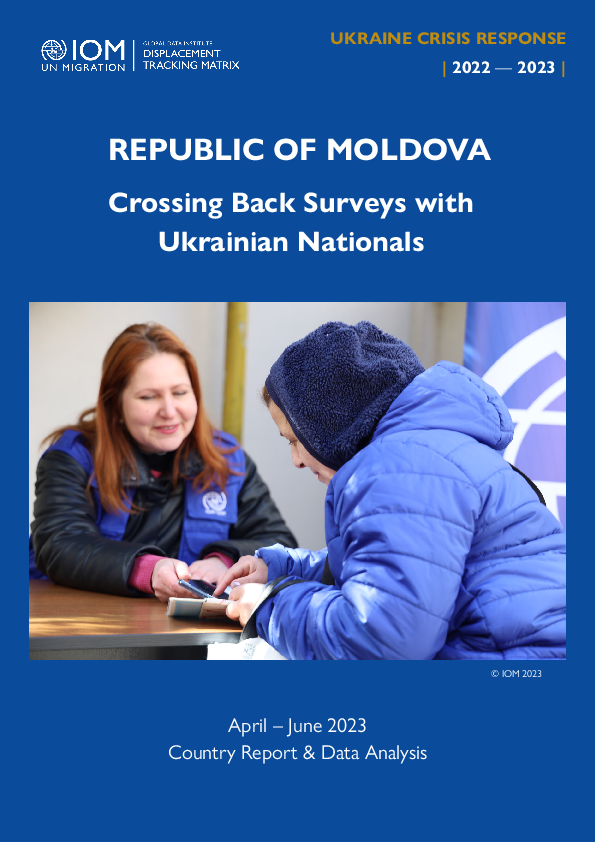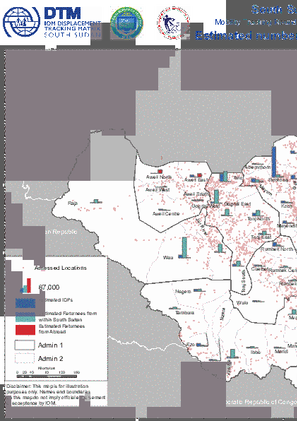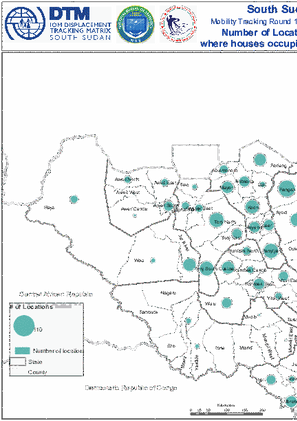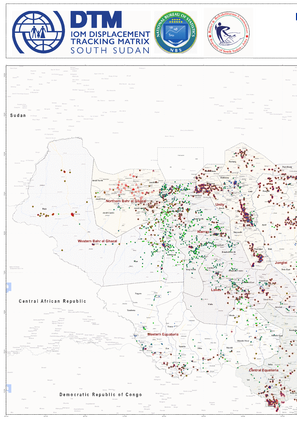-
Countries
-
Data and Analysis
-
Special Focus
-
Crisis Responses

Contact
DTM Europe, DTMMediterranean@iom.int
Language
English
Location
Republic of Moldova
Period Covered
Apr 01 2023
Jun 30 2023
Activity
- Survey
- Flow Monitoring
This report is based on a survey of displacement patterns, needs and intentions conducted by IOM’s Displacement Tracking Matrix (DTM) in the 11 countries included in the Regional Response Plan for Ukraine in 2023: 6 countries neighbouring Ukraine – Belarus, Hungary, Poland, Republic of Moldova, Romania and Slovakia – and other 5 countries particularly impacted by the arrivals of refugees from Ukraine since the start of the war in February 2022 – Bulgaria, Czechia, Estonia, Latvia and Lithuania. The analysis presented in this report is based on data collected between April and June 2023.
Key Findings
• Top oblasts of origin: Odeska (28%), Vinnytska (20%), City of Kyiv (9%), Mykolaivska (7%), Zaporizka (5%), Kyivska (5%), Dnipropetrovska (3%), Kharkivska (3%).
• Intentions to move: settled or planning to settle in the Republic of Moldova (49%), transiting to another country (45%) - mainly to Romania, Germany and Canada. Move back to place of origin in Ukraine (4%).
• Employment status: employed (21%), daily workers (11%), unemployed and looking for a job (11%), student (1%), maternity leave (10%).
• Top needs*: financial support (25%), food products (12%), personal hygiene items (11%), accommodation (8%), medicines (6%).
• Top areas of assistance received*: food supplies (24%), personal hygiene items (21%), financial support (19%), accommodation (7%), vouchers (6%). • Main inclusion challenges*: financial issues (34%), housing (long-term) (16%).
• Transport: walking (28%), mini bus (26%), car (23%), and bus (12%).
* More than one answer possible

Contact
DTM Europe, DTMMediterranean@iom.int
Language
English
Location
Republic of Moldova
Period Covered
Apr 01 2023
Jun 30 2023
Activity
- Survey
- Return Intention
Since 24 February 2022, refugees from Ukraine and Third Country Nationals (TCNs) have been fleeing to neighbouring countries as a result of the war. As of May 2023, more than eight million refugees from Ukraine were recorded across Europe. At the same time, almost 13 million of border crossings of border crossings of Ukrainian and Third-Country refugees and migrants were reported from Ukraine into the neighbouring countries since February 2022.
IOM has deployed its Displacement Tracking Matrix (DTM) tools since mid-April 2022 to collect individual surveys in neighbouring countries with persons crossing into Ukraine, with the aim to improve the understanding of main profiles, displacement patterns, intentions and needs of those moving into Ukraine. This report is based on surveys collected in the Republic of Moldova between 01 April 2023 and 30 June 2023 in two border crossing points, Otaci and Palanca.
Key Findings
• Top 3 countries of stay abroad: Romania (21%), Türkiye (11%), Germany (9%). • Top oblasts of origin: Odeska oblast (43%), Kyiv city and Kyivska (18%), Mykolaivska oblast (13%).
• Intended destinations: going to same oblast of origin (91%), to a different oblast (8%) - mainly to Vinnytska, Odeska & Kyiv city.
• Transport to Ukraine: car (57%), bus (31%), foot (10%).
• Intentions upon crossing back: long-term stay (58%), short-term visit (38%).
• Top needs upon crossing back:* financial support (20%), medicines and health services (6%), food products (9%), employment (8%). Other specified needs (12%) while 28% had no immediate needs.
• Top areas of assistance received:* food products and meals (27%), financial support (26%), NFI/hygiene items (22%), vouchers (2%), accommodation (8%).
* More than one answer possible
Contact
DTM Sudan, DTMSudan@iom.int
Location
Sudan
Activity
- Mobility Tracking
- Baseline Assessment
Period Covered
Jan 01 2023 -Mar 31 2023
DTM identified a total accumulative number of 3,820,772 IDP individuals (763,889 households) in 1,053 locations in 138 localities in 17 states across Sudan. The greatest proportion of displacement (83%) in the country is protracted (ongoing for more than five years, see Diagram 1). An estimated 2,057,846 current IDPs (54%) were initially displaced between 2003 and
2010 at the height of the Darfur crisis. In comparison, 1,081,169 IDPs (28%) observed were initially displaced
between 2011 and 2017, in addition to 40,629 (1%) newly displaced in 2018; 53,288 IDPs (1%) in 2019; 112,742 IDPs (3%) in 2020; 210,274 (6%) in 2021; and 264,824 individuals (7%) observed in 2022.
Population Groups
Survey Methodology
Unit of Analysis Or Observation
Type of Survey or Assessment
Keywords
Geographical Scope
Administrative boundaries with available data
The current dataset covers the following administrative boundaries
Contact
DTM Sudan, DTMSudan@iom.int
Location
Sudan
Activity
- Mobility Tracking
- Baseline Assessment
Period Covered
Jan 01 2023 -Mar 31 2023
DTM estimates a total number of 1,302,938 permanent returnees from internal displacement (193,388 households) in 773 locations, in 71 localities, in 11 states across Sudan. Reporting on returns in a chronological manner, the data indicates that between 2003 and 2010, 168138 returnees (13%) returned to their location of origin. The highest proportion of returns (265,589) occurred between 2011 to 2015 (20% of the total count) – reflective of a mass influx of individuals returning to their habitual residences at the end of the Darfur crisis. This was followed by 137,383 returnees (11%) in 2016, 195,637 returnees (15%) in 2017, and 159,648 returnees (12%) in 2018. The lowest proportion of returnees returned in 2019
(64,592) and 2020 (57,097), representing 5% and 4.4% respectively. Finally, in 2021 and in 2022, field teams identified 71,905 (6%) and 182,949 (14%) permanent returnees respectively.
Population Groups
Survey Methodology
Unit of Analysis Or Observation
Type of Survey or Assessment
Keywords
Geographical Scope
Administrative boundaries with available data
The current dataset covers the following administrative boundaries






